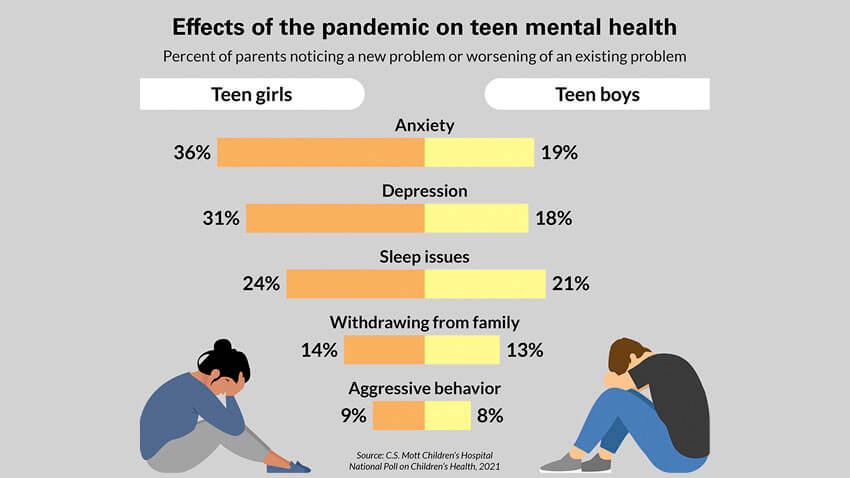Virtual Learning Effects Mental Health
Mental Health is a Growing Problem; The Pandemic Adds to It
Statistical findings of the pandemic on teen mental health. Photo from the University of Michigan Health Department.
October 28, 2021
Last school year was definitely not the year anyone was expecting. For teens, pandemic restrictions may have meant months of virtual school, less time with friends, and canceling activities like sports, band concerts and prom.
With the abrupt mass transition to distance learning in schools, students’ home and school environments merged; residual stress from the school day knows no boundaries. They face at-home stressors, like the care and support of younger siblings, internet issues, learning distractions, restricted privacy for completing classwork, inadequate space to study, and work obligations to help support their families during this period. These apply pressure from yet another angle to students’ normal school-related stressors and healthcare concerns heightened by the pandemic.
According to a survey done by the Youth Truth National Nonprofit Organization, 70% of students reported obstacles to their virtual learning. Of those students, 64% reported facing distractions at home and 50% reported feeling depressed, stressed, or anxious.
Some students thrived off the opportunity to have more agency over their schedules and learning pace, while for others it adds an additional factor to the already eventful school year.
When given the chance, most students jumped on the opportunity to go back in person. But, a few students, including seniors, Brianna Harris and Jessi Ruiz, decided to continue their learning from home.
“In a weird way, virtual school is much more stressful for me,” said Ruiz. “I’m not good at all at holding myself accountable so I find myself falling behind a lot, which sucks because catching up is really hard. People say that it shouldn’t be hard and to just keep a schedule but it’s not that easy.”
For Ruiz, virtual learning was not something she expected to continue after last school year. Her mom, ultimately, made the decision for her to continue virtual learning this year. The only positive thing she recalls from learning at home is being able to snuggle up in her room. The isolated learning has destroyed her social skills since she hasn’t been to actual school since March of 2020.
For young people who rely heavily on social connections for emotional support, these distance learning adjustments may have taken a heavy toll on their mental health.
According to the C.S. Mott Children’s Hospital National Poll on Children’s Health at Michigan Medicine, 46% of parents say their teen has shown signs of a new or worsening mental health condition since the start of the pandemic in March 2020.
Virtual learning has impacted many aspects of their lives, including relationships with friends and family. It also disconnects them from the school community. It’s really hard to participate in clubs and sports when they’re not at school.
“I’m lucky to have a wonderful group of friends I have stayed in touch with throughout this whole COVID thing,” said Ruiz. “I attended the Senior Sunrise and I do want to attend other social events like Homecoming and Prom.”
Whether you’re in-person or still virtual, a majority of adolescents will think back to the COVID-19 pandemic and not remember having to wear “annoying masks” or attend Zoom but will remember the impact Covid had on their mental health.
According to a National 4-H Council poll, 64% of teens believe COVID-19 will have a lasting impact on their generation’s mental health.
Harris has had a positive experience while virtual learning, she is a partial attendance student, so she only has about 3 hours of schoolwork a day, which allows her more time to work. She’s even thought about coming back but decided against it because she has been able to be more independent and successful while virtual learning.
“Virtual learning has affected my mental health in a weirdly positive way. In-person was super stressful and the day was filled with back-to-back work and classes,” said Harris. “It has also allowed me to become closer with my family and depict who my true friends are.”


